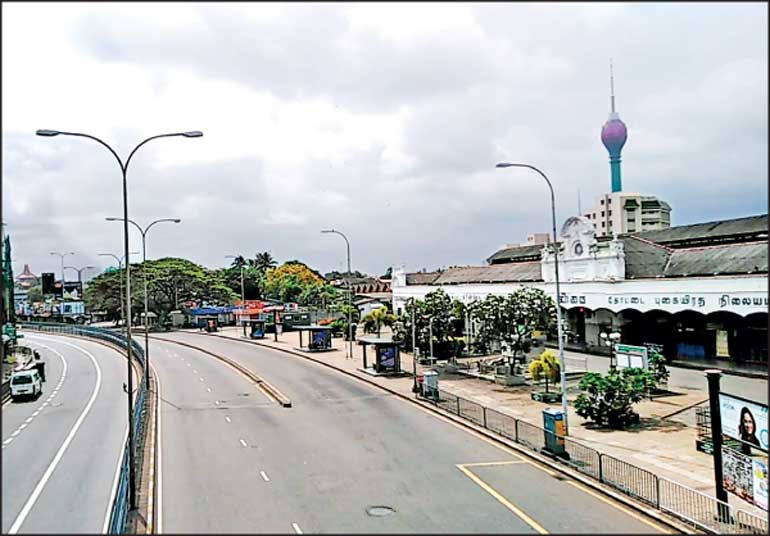Friday Feb 20, 2026
Friday Feb 20, 2026
Saturday, 18 September 2021 02:38 - - {{hitsCtrl.values.hits}}

By Shailendree Wickrama Adittiya
The country’s COVID-19 detections exceeded 500,000 with the detection of 2,078 COVID-19 positive persons yesterday as the Government extended the quarantine curfew by another week till 1 October.
The decision to extend the quarantine curfew was made at the Special Committee on COVID-19 Control chaired by President Gotabaya Rajapaksa held online yesterday. It will be lifted depending on the COVID-19 situation in the country.
With Friday’s detection a total of 500,772 COVID-19 cases have been detected in Sri Lanka to date.
The decision to extend curfew comes after health officials advised against relaxing regulations despite a gradual decline in the number of COVID-19 patients detected daily as well as COVID-19 fatalities.
On 20 August, when quarantine curfew was first imposed, daily detections were as high as 4,890. In the days that followed, daily COVID-19 detections exceeded 5,000, with 5,961 COVID-19 patients detected on 26 August.
However, since the end of August, a gradual decline in COVID-19 detections has been apparent, with daily detections dropping below 5,000 by the end of August. On 1 September, 3,828 persons tested positive for COVID-19 and a week later, on 7 September, 2,964 persons tested positive for COVID-19.
On Thursday, 2,271 persons tested positive for COVID-19 and 2,078 persons tested positive for COVID-19 yesterday.
A total of 118,960 COVID-19 patients have been detected since quarantine curfew was enforced.
In terms of COVID-19 fatalities, the Health Services Director General confirmed 198 COVID-19 deaths on 20 August, which raised the country’s COVID-19 death toll to 7,183.
On 25 August, the COVID-19 death toll exceeded 8,000 and five days later, on 30 August, it exceeded 9,000. On 4 September, the confirmation of 189 COVID-19 deaths raised the country’s COVID-19 fatalities to 10,140.
Health officials on Thursday confirmed 121 COVID-19 deaths and the country’s COVID-19 death toll currently stands at 11,938. A total of 4,755 COVID-19 deaths have been confirmed since quarantine curfew was enforced.
While quarantine curfew will be in place for two more weeks, essential services will be carried out without any disruption to daily life. Economic centres will remain open during this time.
Public health inspectors have also been given the responsibility of giving necessary guidance to small and medium scale enterprises and self-employed persons to pursue their livelihoods without hindrance.
According to the President’s Media Division, measures will be taken to maintain essential public services like the Department of Motor Traffic and the Land Registry.
The IGP has also been instructed to strictly enforce the law against those who do not comply with health recommendations and violate quarantine regulations.
“The discussion also focused on the opening of rural schools with less than 200 students. In this context, the President emphasised the need for the Provincial Directors of Health Services to work in close coordination with the Ministry of Education,” the PMD said.
The PMD added that the importance of conducting awareness programs for parents and children on health recommendations was highlighted during the meeting.
“President Rajapaksa explained to the Public Health Inspectors’ Association (PHIA) President Upul Rohana, that it is the main responsibility of the public health inspectors to encourage the public to be vaccinated,” the PMD statement read.
According to the President’s Media Division, only the Pfizer COVID-19 vaccine will be given to children and vaccination will only be carried out in hospitals.
The committee of health experts tasked with providing recommendations on vaccinating children has recommended that vaccine priority be given to children between the ages of 12 to 19 years who are suffering from chronic diseases.
At the meeting, Health Services Director General Dr. Asela Gunawardena stated that measures have been taken to conduct vaccination only at relevant clinics with the permission of the parents and subject to the supervision of the clinical specialist.
The committee stated that vaccines are currently recommended for everyone between the ages of 15 and 19, noting that the rest of the world has not yet moved towards vaccinating children in the 12 to 15 age group.